Spanish is one of the world’s most beautiful languages. It’s the official language of at least 20 different countries—spread between Europe and the Americas with hundreds of millions of native speakers.
Because of its vast spread around the world, there are a number of different varieties and dialects of the language making it as diverse as it is interesting.
I’ve taken Spanish language courses everywhere from Texas to Spain and practiced the language around the world. But it was when visiting Costa Rica for the first time that I learned just how challenging the regional differences can be.
If you’ve studied Spanish yourself, it’s quickly apparent that the fact the language is spoken in so many countries makes it extremely rich and polysemic (a beautiful English word for multiple meanings).
But also tough as a language student. Some words vary greatly between countries and what you speak in Spain may be undistinguishable when traveling in Central or South America.
And, like German, Spanish has its own untranslatable words—but that’s what makes this such a fun language to learn…
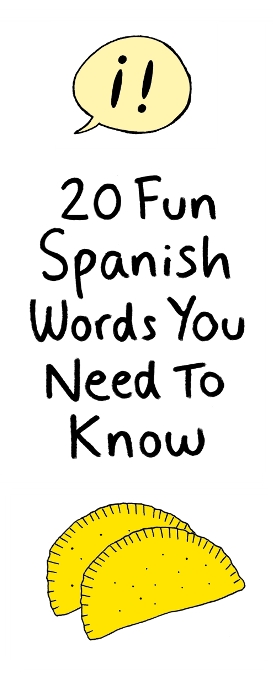
20 Funny Spanish Words You Need to Know
To help come up with this list of cool Spanish words (some useful, some less-than-useful), I’ve collaborated with Europe-based illustrator Clairikine for the graphics. A lot of these are pretty Spanish words—poetic in the way they sound or in the instances they’re used.
I’ve always found beautiful Spanish words when learning the language, and the Spanish language to be one of the prettiest. Just like the people and the culture and the history, these fun/cute/pretty Spanish words and phrases are a wonderful symbol of the beauty of the Spanish language.
1. Mae (Costa Rica), Chamo (Venezuela), Tío (Spain), Quillo/quilla (Andalusia)
These words are some of the ways you can say “dude” in Spanish. Don’t mix them up and make sure you use the right version in its own country.
These are just a handful of examples I’ve encountered on my own travels, but I’m sure you’ll find other local expressions throughout other Latin American countries. In the Costa Rican dialect of Spanish, for example, the word mae is also used to express surprise and a lack of intelligence.
Because the word mae also works as a pronoun, this is a perfectly comprehensible sentence (maybe for a native Costa Rican): Ay mae, this mae is so mae that he’s still dating that mae! Every usage there has a different meaning.
2. El de la vergüenza (Spain)
Literally this Spanish expression means “the one of shame” and it’s used to describe the last piece of food no one wants to take.
We all know that feeling when there’s just one little bit of manchego cheese left on the plate and you’re dying to eat it but you also don’t want to be that guy!
Oh, and by the way, it is not acceptable to eat el de la vergüenza, unless the evening has come to an end and everyone is leaving the table. Then you can, but be discreet!
3. La sobremesa (Spain)
This is another Spanish word I like. Used mostly in Spain, it literally means “over the table” and describes what happens after lunch or dinner when you’re simply hanging out with the people you’ve just shared your meal with—be it your friends, family or business partners.
La sobremesa happens after you’ve finished eating but also before leaving the table. It’s a time of relaxation spent waiting for digestion and enjoying the company of your loved ones.
This tradition is the reason you don’t get the bill unless you ask for it when eating out in Spain—they wouldn’t want to spoil your sobremesa by rushing you! Curiously, another meaning for sobremesa is for dessert, so that many people may eat their sobremesa during la sobremesa.
4. El lampiño (Latin America)
Lampiño is a cute Spanish word that describes a person who is hairless, has no facial hair and/or little-to-no body hair. It’s used most often to describe men who can’t grow a full beard… Like me ;)
5. La vergüenza ajena (Latin America)
Remember my post about funny German words? It included fremdschämen, which is the exact equivalent of la vergüenza ajena: it means shaming yourself vicariously because of someone else’s actions.
It could also be used to emphasize something stupid (like racist or controversial ideas) said by someone, but also for actions like when someone laughs so hard that orange juice comes out of his/her nose.
Politicians, in both Spain and Latin America, are public figures looked at with vergüenza ajena by their citizens. (Did someone say Donald Trump?)
6. Friolero/caluroso (Spain and Latin America)
While talking about the weather is an ubiquitous conversation topic (especially in Britain), the Spanish language has dedicated words used to call people who are especially sensitive to the cold (frioleros) or to the heat (calurosos).
And in typical Spanish fashion, there are regional varieties of the same word. In Costa Rica and other Latin American countries, for example, a friolero is called a friolento! However, the word caliente has a totally different meaning—one not necessarily suitable for children.
So, which side are you on? After the harsh winter we’ve had in Europe, I think I stand with the frioleros!
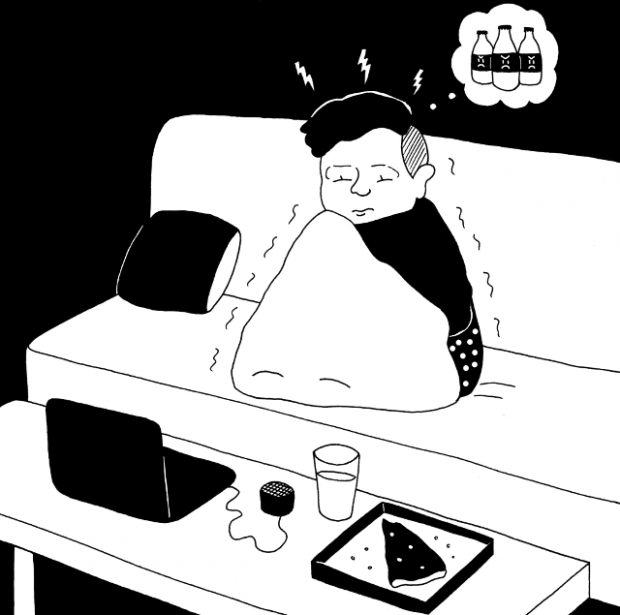
7. Vale (Spain), Tuanis (Costa Rica), Chevere (Venezuela), Chido (Mexico)
Yes, Spanish does differ a lot depending upon the country where it’s spoken! These four words all mean the same thing though, and are synonymous with positive adjectives such as bueno, bien, bonito and lindo.
Basically, they’re the equivalent of ‘cool’ or ‘okay’ in English so be sure to learn the right, local version before visiting a Spanish-speaking country as you’ll probably be using it a lot.
It’s a helpful word to pick up when traveling. Most Spanish speakers are familiar with each of the expressions and they’ll understand what you’re saying, but they’ll immediately know the nationality of your Spanish teacher: did you learn Spanish in Spain…or Guatemala? ;-)
8. Achuchar (Spain)
Achuchar is a really cute verb that means to hug someone very affectionately, sometimes even to the point that they can’t breathe. It also means to cuddle and is often used when referring to the interaction between a mother and her child.
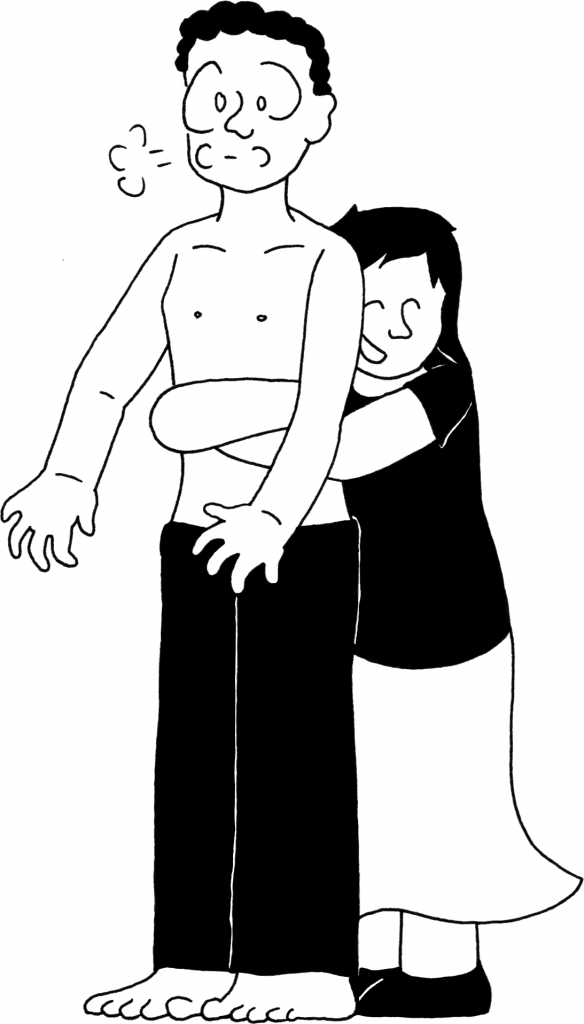
9. Forrarse (Latin America)
This old fashioned verb is mostly used in Latin America and means ‘to become rich,’ usually over a short period of time. Estar forrado is also an interesting expression which means ‘being loaded.’
Note: in some countries, el forro is a word used for a condom and forrarse, a word used for the act of having protected sex.
10. El antro (Central America)
In Mexico, an antro is a nightclub which usually plays electronic music, reggaeton or hip hop. In the rest of the Spanish-speaking world, however, calling a place an antro is usually pejorative as this word is used to describe a dive, or a bad, cheap hotel.
Be careful in case someone recommends one to you as they might be pulling your leg if they aren’t aware of the term.
11. Enchilar (Mexico)
This verb derives from chile (chili)—one of the most famous staples of Latin American cuisine. It means both to season something with chilies or to become red in the face as a result of eating chilies.
Moreover, in Mexico, enchilar means to annoy and enchilarse, the reflexive form, also means to get angry or mad. In Costa Rica, estar enchilado means to be envious of something or someone. It’s a poetic reference to a lot of burning feelings.
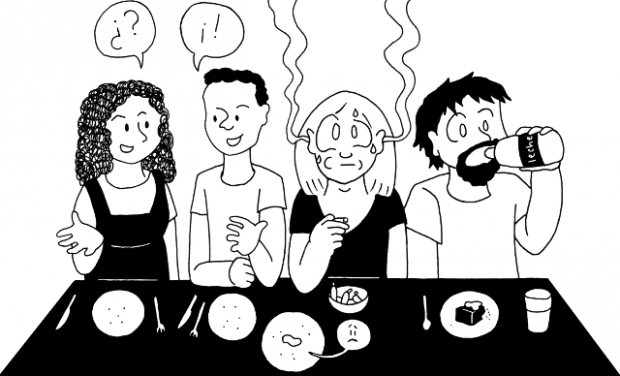
12. Tinieblo (Colombia)
Tinieblo is a really cute word that’s mostly used in Colombia. It means ‘secret boyfriend’ and no, it’s not only dedicated to describing children’s crushes!
Tiniebla also has the additional meaning of being in the state of almost-darkness, where light isn’t totally absent but barely perceptible.
13. Botellón (Spain)
This is one of my favorite Spanish traditions. Botellón, literally meaning ‘a big bottle,’ is how Spanish people call the art of gathering in an outdoor public space such as a parc or a plaza to drink with friends and socialize.
It’s often how they “pre-game,” as these gatherings often end when people head out to a club or a bar. The drink of choice is often calimocho, which is a mixed drink made by mixing red wine and cola—it’s a poor man’s sangria and it’s delicious!
Simply mix half and half (preferably the cheapest red wine you can find) and you’re guaranteed a headache the next day—but with the right botellón, it’s worth it!
14. Empalagarse (Spain and Latin America)
Empalagarse is a verb that means to be overcome with sweetness, sometimes even to the point of getting sick.
If you want to avoid getting sick of sweetness, you’ll need lots of water or coffee to counteract the candy, chocolate or cake. Empalagarse is also used for words and actions—especially for extreme cuteness.
So when having a dinner with a couple who’s recently in love and speaking to one another like babies in that all-too-cute voice, you can describe the scene with the verb emaplagarse.
Related: Learning Spanish in Seville, Spain – What I’ve Learned
15. Amigovia/o (Latin America)
Can you guess what this portmanteau word means? It’s formed by putting together two nouns, namely amigo, which means ‘friend’ and novio or novia, meaning respectively ‘boyfriend’ or ‘girlfriend.’ Therefore, an amigovio or amigovia means ‘friend with benefits’. A pretty cute and useful word if you ask me! The word is also used for the period of transition, before the amigo turns into a novio.
16. Estrenar (Latin America)
This is another interesting verb that we’re lacking in English. Estrenar means to use or wear something for the first time, for example new shoes or a new notebook.
We all love to talk about that “new car smell” and yet in Spanish-speaking countries, they’ve actually got a verb for it!
For artists, the first performance of a new play is an estreno and the same is valid for the premiere screening of international movies like Star Wars. If you buy something specifically for a special purpose (such as a new swimsuit for your holiday), estrenar can be used to describe the situation.
17. El embotellamiento (Latin America)
I’d never given the expression ‘traffic jam’ much thought before, but learning the word embotellamiento definitely got me thinking.
While we use the word ‘jam’ to describe what happens when there is too much traffic, the Spanish language refers to a ‘bottleneck,’ which I find both funny and endearing.
In Costa Rica, an embottelamiento might also be called a presa—which is the same word for a dam. It’s all in the context, maes!
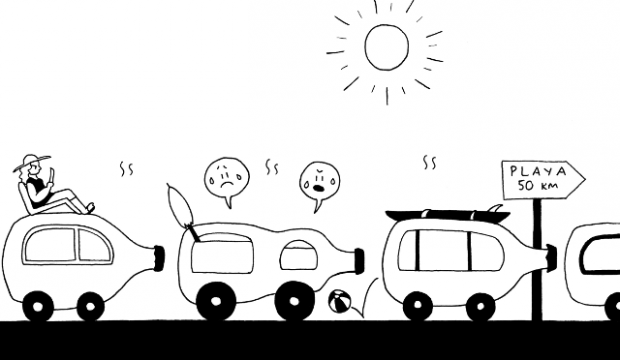
18. El bullicio (Spain and Latin America)
Bullicio is the Spanish equivalent of ‘bustle.’ It’s used to describe a party of noise or something that’s very loud.
A good occasion to use this word would be when mentioning el bullicio de los mercados, or ‘the hustle and bustle of the street market’ which, as you probably know, is hard to ignore—especially in any Latin American country!
19. La resaca (Spain and Latin America)
Literally, resaca means ‘the undercurrent,’ and that’s the way a hangover is called in Spanish—but this is a word many English speakers have already heard!
Though ‘being hungover’ is translated as tener resaca in everyday speech, don’t forget that the word also refers to the undercurrent that brings driftwood and other debris to the shores after a storm.
It’s a lot more poetic than imagining yourself buried under a blanket on the couch binge-watching Netflix after a night out! The last thing someone wants when they’re having a resaca is bullicio. Silence, please—my head is killing me!
20. Desvelado (Central America)
Desvelado means being kept awake, being sleep-deprived or staying up late. Very often, it refers to being unable to sleep because of something in particular, such as being worried about something (ie, an exam, taxes, infidelities, pain) or excited about an upcoming event.
As a travel blogger, I must say I’m often desvelado before leaving for a trip, especially if I am taking an early flight and haven’t yet packed! The word is also used when you pull an all-nighter, spending the entire night working. For example, me. Right now. Because I’m desvelado writing this post. Bye, bye. Adios!
If you’re interested in learning Spanish, check out the various language websites and apps which offer online language lessons with qualified native-speaking teachers in online classrooms.

Aw, I love the meaning of Achuchar. We should definitely do more of that!
I like it a lot, really fun. But, in fact, we say “caluroso” instead of “caloruso” altough the word comes from “calor”.
Greetings from Spain
Although, sorry.
¡ Que chido !
Lampiño, vergüenza ajena, forrarse, estrenar, embotellamiento and desvelado are widely used in Spain too, with the very same meaning you describe in the article.
You should write an article about profanities in spanish. The first thing anyone should learn about any language is that. You really have to know when you’re being insulted or the subtle differences of use between countries of some words wich are normal in Spain and profane in other places, like “concha” o “coger”, and vice-versa, like “polla”.
Greetings from Argentina
“verb emaplagarse” It’s no okay, right isla “verbo empalagar”
Verbo are: comer, reír, llorar, cantar, etc … Ending: er, ar, ir. Al veebs un spanish. Thank you
You’re wrong- the “se” makes it reflexive- still a verb
I’m sure “emaplagarse” is just a typo. And I have no doubt the writer is familiar with “veebs” endings. However, you have to be aware that ’empalagar’ is a reflexive verb. Check your grammar books.
Pretty sure that vale in Spain just means OK or Got it. Cool is guay in Spain.
Desvelado, embotellamiento, vergüenza ajena, forrarse, embotellamiento and estrenar are used in Spain, too.
Love the article. Greetings from Andalucía!!
I do not know if you ever visit Argentina but we have many “lunfardo” words here that you would enjoy.
For example for the Spanish Vale from Spain we would say “Dale”, for Spanish “Tio” we would say “amigo” or even “boludo”
Here in Argentina if “Le das a alguien” (you would give someone literally translated) would not mean to give something to someone. It actually means that you like the other person very much and you are probably sexually interested in that person.
The same for “comerle la boca a alguien” (Eat someone mouth literally) means to kiss passionately.
We here in Argentina have our own Spanish :P
“Le das a alguien” doesn’t PROBABLY mean that you’re sexually interested in someone. It means JUST THAT all the time, “darle” refers to sexual attraction and is similar to the English “to do someone”.
In Argentina q big part of the asado is the achuras. We use that word to refer to the parts of the cow that are not muscle but that we eat asadas. So achurar is not a very common verb but when used the meaning is more like chopping. So careful with the use in Argentina! Great article. Thanks for sharing!
Meli, no es la misma palabra! Es achicar no achurar! Ahora si le eran porque son parecidas, ahí los embocan jajjajqjq
Meli, no es la misma palabra! Es achuchar no achurar! Ahora si le erran porque son parecidas, ahí los embocan jajjajqjq
This post is such a goodie!! I use quillo/a and achuchar on a daily basis, and met my husband at a botellón!! My friend gave me a great book called Don’t Show This Book to Your Spanish Teacher, or something to that effect – I feel like you’d enjoy it!
Are you sure that “Vale” is the same as “Chevere/Chido”? Because saying “vale” IS like “ok”, but not “cool” (I would say “guay” for Spain) while chevere and chido are “cool” but actually not “ok” (like, idk, if you see something cool, you say that something is chido/chevere but you don’t say it’s vale, and if someone ask you to go to the cinema you say vale but not chido/chevere, it’d sound as weird if it actually the convo would go X: “hey, do you want to go to the cinema?” Y: “cool”).
In Argentina we also use “la previa” instead of “botellón”.
Completely funny and correct! Im from Argentina, as mariela said, we have soooo many current expressions !!! Anyway, congratulations for the article, its excellent!!!
In Argentina “forro” means a lot of things, it’s a word we also use to say that somebody it’s a bad person, he did something mean.
The word “mae” in costa rica, it’s a lot like the word “boludo” in Argentina, witch means litteraly “big balls” and also:
-buddy
-stupid
-we also use it when we are surprise, eg: boluuudo! omg! can’t believe it!
In Guatemala “cuate” means good friend.
I think you are lacking a very important word in South America specially. The “Huevon”. Huevon could mean SO many different things depending on the context. It can vary from “huevón” as being a friend or being an idiot haha. It’s widely used in Chile and other countries a bit less such as Argentina and Perú.
Anyhoo… great post!